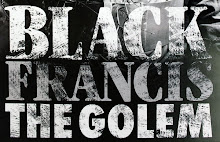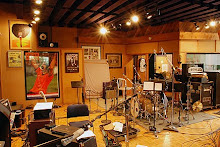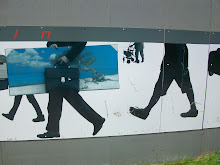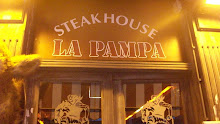Ronald Shannon Jackson, Composer and Avant-Garde Drummer, Dies at 73
By STEVE SMITH
Published: October 22, 2013
Ronald Shannon Jackson, an avant-garde drummer
and composer who led an influential electric band and performed with many of
the greatest names in jazz, died on Saturday at his home in Fort Worth. He was
73.
His death, from leukemia,
was confirmed by his son Talkeye.
Mr. Jackson, whose
distinctive look included long hair that he once braided with rivets and subway
tokens, had a muscular style that set him apart from his fellow avant-garde
jazz drummers, providing for a thunderous yet economical rumble infused with
funk, marching-band patterns and African styles. His band, the Decoding
Society, showed his knack for writing rigorous yet approachable music.
He performed over the years
with Charles Mingus, Betty Carter, Jackie McLean and Joe Henderson. But his
name was most closely linked with three free-jazz pioneers: the saxophonist
Albert Ayler, the pianist Cecil Taylor and, foremost, the saxophonist Ornette
Coleman, who also hailed from Fort Worth.
After his brief but
important stint with Mr. Coleman’s groundbreaking electric band, Prime Time,
Mr. Jackson forged ahead with the Decoding Society in 1979. The group extended
and streamlined the kinetic, boldly polyphonic style that Mr. Coleman had
introduced while incorporating rhythms derived from ethnic styles.
“We’re coming from a world
music as opposed to one kind of beat,” Mr. Jackson told The New York Times in 1982.
“Everything we do has a
foundation,” he continued in that article. “I think the African phrases are
very obvious. I think the funk phrases are very obvious. I think the Oriental
phrases are obvious. I think the Bulgarian rhythms are there — I hear all of
it.”
Throughout the 1980s and
’90s, the band was a proving ground for veteran instrumentalists like the
saxophonist Charles Brackeen and the violinist Billy Bang, as well as promising
newcomers. Two of Mr. Jackson’s protégés, the guitarist Vernon Reid (later of
the rock band Living Colour) and the bassist Melvin Gibbs (who went on to play
with the punk-rock vocalist Henry Rollins), performed with him sporadically
through his final years.
Mr. Jackson was born in Fort
Worth on Jan. 12, 1940. His mother, Ella Mae, played piano and organ at a
Methodist church and his father, William, was the proprietor of Fort Worth’s
only black-owned record store and jukebox supplier. The saxophonists King
Curtis and David (Fathead) Newman were relatives; among the musicians who
preceded him at I. M. Terrell High School were Mr. Coleman and the saxophonists
Dewey Redman and Julius Hemphill. Mr. Jackson played his first public
engagement, with the saxophonist James Clay, at age 15, then worked with Ray
Charles’s band in Dallas. In 1966 he went to New York, where he enrolled at New
York University. That year he made his first recording, with the Charles Tyler
Ensemble, and joined Ayler’s band. His work with Ayler is documented on two
roughly recorded but urgently played volumes of “Live at Slug’s Saloon.”
By 1967 Mr. Jackson’s career
was derailed by drugs, he said in an interview published by Fort Worth Weekly in 2003. Introduced to Buddhism by the bassist
Buster Williams in 1974, Mr. Jackson regained his health. A passing encounter
with Mr. Coleman led to a four-year run with the newly formed Prime Time, which
recorded the watershed album “Dancing in Your Head” and its successor, “Body
Meta.” He joined Mr. Taylor’s band in 1978 and stayed for six months, appearing
on four albums.
Mr. Jackson firmed the
Decoding Society in 1979, and it would occupy him for the rest of his career.
Not just a showcase for his drumming, flute and schalmei (an
archaic horn), the band also showed his increasing confidence as a composer.
Albums like “Mandance” (1982), “Barbeque Dog” (1983) and “Decode Yourself”
(1985) reaped critical acclaim. He seemed poised for a breakthrough.
He still found time for side
projects. In 1986 he joined Last Exit, a blustering jazz-metal quartet with the
saxophonist Peter Brötzmann, the guitarist Sonny Sharrock and the bassist Bill
Laswell. Another venture with Mr. Laswell, SXL, brought the two together with
the Indian violinist L. Shankar, the Senegalese percussionist Aiyb Dieng and
the South Korean percussion troupe Samulnori. In 1987 Mr. Jackson joined Mr.
Gibbs and the guitarist Bill Frisell in a trio, Power Tools, which made one
album, “Strange Meeting.”
Commercial success eluded
Mr. Jackson. But Decoding Society albums like “Red Warrior” (1990), a fiery
guitar-oriented session, and “What Spirit Say” (1994), featuring the
saxophonist James Carter, showed that he had never stopped evolving as a
composer. “Shannon’s House,” his final studio recording as a leader, was issued
in 1996.
In 2000 Mr. Jackson’s
playing was curtailed by nerve injury in his left arm. By 2005 he had recovered
sufficiently to play in the trumpeter Wadada Leo Smith’s Golden Quartet. Mr.
Jackson played his final public concert with a new Decoding in July 2012 in Dallas.
Besides his son Talkeye, Mr. Jackson is survived
by his wife, Natalie; two other sons, Gregory and Clifford; a daughter, Sunday;
three grandchildren; and one great-grandson.










































































































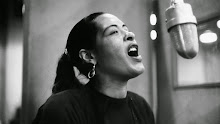



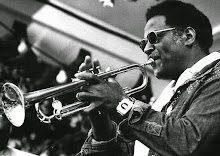





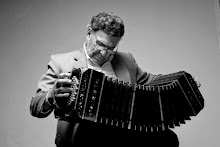


























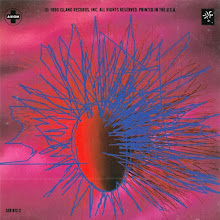






































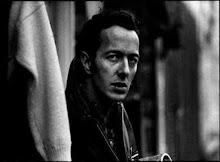


























![Emilio Aragón [Miliki]](https://blogger.googleusercontent.com/img/b/R29vZ2xl/AVvXsEgU984UtiH44tEevrjWKEP26uzJpkSR0NMPCyUzIg16SRop9lUziLazCa4V3Ol9LgmRdnzgHiyLD-8SPVx7J7cZt1G5jmzE1lDfWyzlvXaq7dp2EQ5OLle-bBG3ZcovVu5h00ZzuOwXVCo/s220/Gracias+Miliki%2521.jpg)

























































































































































